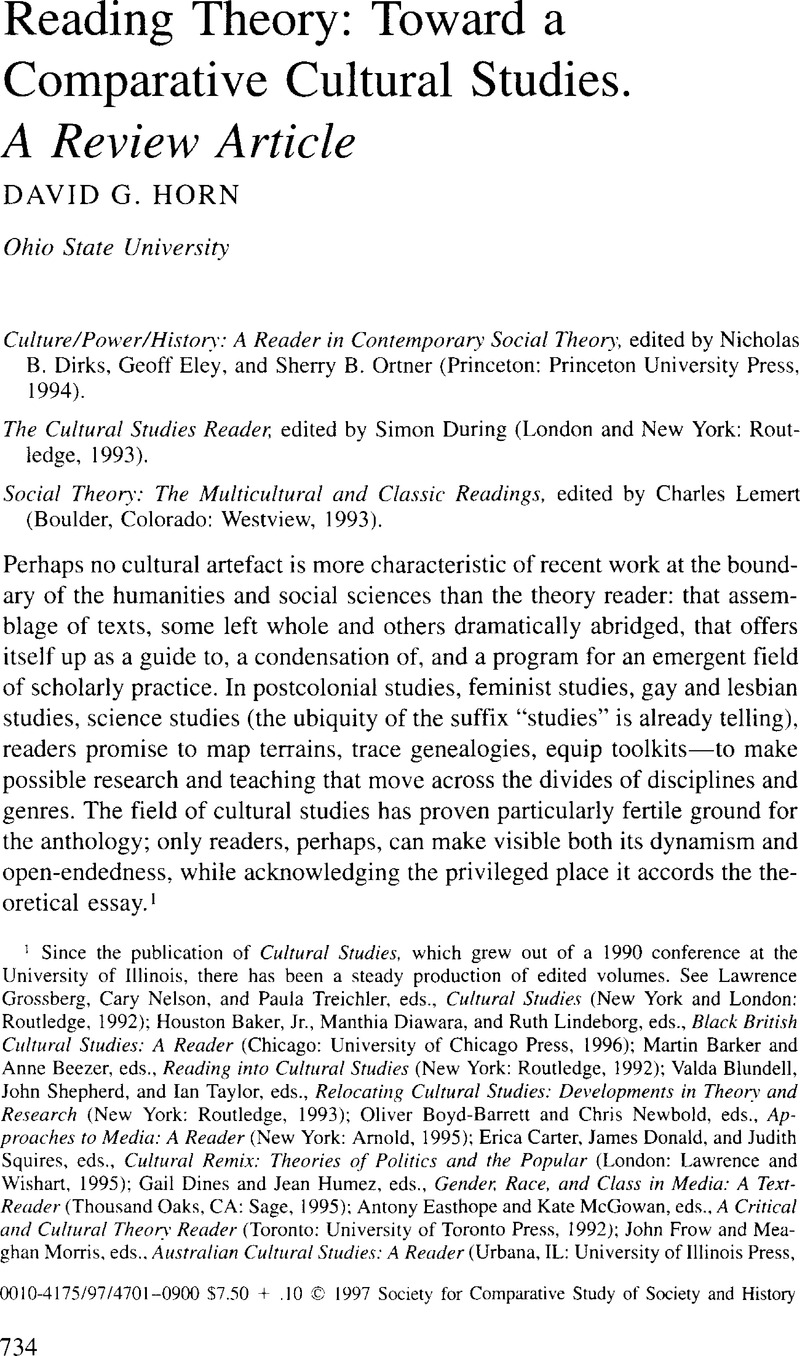No CrossRef data available.
Article contents
Reading Theory: Toward a Comparative Cultural Studies
Published online by Cambridge University Press: 25 April 2012
Abstract

- Type
- Shaping the Social Being
- Information
- Copyright
- Copyright © Society for the Comparative Study of Society and History 1997
References
1 Since the publication of Cultural Studies, which grew out of a 1990 conference at the University of Illinois, there has been a steady production of edited volumes. See Lawrence Grossberg, Nelson, Cary, and Treichler, Paula, eds., Cultural Studies (New York and London: Routledge, 1992Google Scholar); Baker, Houston Jr., Diawara, Manthia, and Lindeborg, Ruth, eds., Black British Cultural Studies: A Reader (Chicago: University of Chicago Press, 1996)Google Scholar; Barker, Martin and Beezer, Anne, eds., Reading into Cultural Studies (New York: Routledge, 1992Google Scholar); Blundell, Valda, Shepherd, John, and Taylor, Ian, eds., Relocating Cultural Studies: Developments in Theory and Research (New York: Routledge, 1993CrossRefGoogle Scholar); Boyd-Barrett, Oliver and Newbold, Chris, eds., Approaches to Media: A Reader (New York: Arnold, 1995Google Scholar); Carter, Erica, Donald, James, and Squires, Judith, eds., Cultural Remix: Theories of Politics and the Popular (London: Lawrence and Wishart, 1995Google Scholar); Dines, Gail and Humez, Jean, eds., Gender, Race, and Class in Media: A TextReader (Thousand Oaks, CA: Sage, 1995Google Scholar); Easthope, Antony and McGowan, Kate, eds., A Critical and Cultural Theory Reader (Toronto: University of Toronto Press, 1992Google Scholar); Frow, John and Morris, Meaghan, eds.. Australian Cultural Studies: A Reader (Urbana, IL: University of Illinois Press, 1993Google Scholar); Gray, Ann and McGuigan, Jim, Studying Culture: An Introductory Reader (London and New York: Arnold, 1993Google Scholar); Mukerji, Chandra and Schudson, Michael, eds., Rethinking Popular Culture: Contemporary Perspectives in Cultural Studies (Berkeley and Los Angeles: University of California Press, 1991)Google Scholar; Munns, Jessica and Rajan, Gita. eds., A Cultural Studies Reader: History, Theory, Practice (New York: Longman, 1995Google Scholar); Scannell, Paddy, Schlesinger, Philip. and Sparks, Colin, eds., Culture and Power: A Media, Culture and Society Reader (Newbury Park: Sage, 1992)Google Scholar; Storey, John, ed., What is Cultural Studies?: A Reader (New York: Arnold, 1996Google Scholar).
2 Lemert writes in a postface, “Final Notes: Where Does Reading End?,” that he would ask students to supplement his collection by reading the whole of The Protestant Ethic or Souls of Black Folk (p. 663).
3 On the emergence of “the social” see Donzelot, Jacques, The Policing of Families (New York Pantheon, 1979Google Scholar), and especially the preface by Gilles Deleuze; Ewald, Francois, L'Etat providence (Paris: Grasset, 1986Google Scholar); Procacci, Giovanna, “L'economia sociale ed il governo della miseria,” Autaut, 167–8:63–80Google Scholar; Rabinow, Paul, French Modern: Norms and Forms of the Social Environment (Cambridge: MIT Press, 1989Google Scholar).
4 See, for example, Ashcroft, Bill, Griffiths, Gareth, and Tiffin, Helen, eds., The Post-Colonial Studies Reader (New York: Routledge, 1995Google Scholar). For readers on postcolonial theory that resist this flattening, see Williams, Patrick and Chrisman, Laura. eds., Colonial Discourse and Postcolonial Theory: A Reader (New York: Columbia University Press. 1994Google Scholar) and Barker, Francis, Hulme, Peter, and Iversen, Margaret, eds., Colonial Discourse, Postcolonial Theory (Manchester: Manchester University Press, 1994Google Scholar).
5 See, for example, Castel, Robert, Les métamorphoses de la question sociale: line chronique du salariat (Paris: Fayard, 1995Google Scholar) and Rosanvallon, Pierre, La nouvelle question sociale: Repenser I'état providence (Paris: Seuil, 1995Google Scholar).
6 For a provocative discussion of what is at stake in theorizing the cultural in the university of the late twentieth century, see Readings, Bill. The University in Ruins (Cambridge: Harvard University Press. 1996Google Scholar).
7 Hoggart, Richard, The Uses of Literacy (Harmondsworth: Penguin, 1957Google Scholar); Williams, Raymond, Culture and Society: 1780–1950 (Harmondsworth: Penguin, 1958Google Scholar). Compare the origin stories told by Hall, Stuart, “The Emergence of Cultural Studies and the Crisis of the Humanities,” October, 53 (Summer 1990), 11–23CrossRefGoogle Scholar and Lawrence Grossberg, “The Formations of Cultural Studies: An American in Birmingham,” Relocating Cultural 'Studies (Summer 1990), 21–66.
8 During is particularly fascinated by the relations between the triumph of Thatcherism and cultural studies re-orientation toward the “culture of difference.” Culture is newly theorized at precisely the moment that Thatcher announces that “there is no such thing as ‘society’” (p. 13). Compare Marilyn Strathern's discussion in After Nature: English Kinship in the Late Twentieth Century (Cambridge: Cambridge University Press. 1992Google Scholar).




